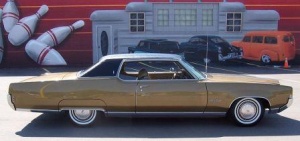Chapter 8
- Please keep these annotations SPOILER-FREE by not revealing information from later pages in the novel.
Page numbers refer to editions with 369 pages, where the story begins on page 1. Not sure if there are other editions with variant pagination. Please let us know otherwise.
Contents
Page 111
There is no direct cue from the narrator that this the next day, but considering that Doc spent the night tripping, and now Aunt Reet's office is open, it's safe to assume that this is the seventh day of the narrative, Monday, March 30, 1970.
Arbolada Savings and Loan in Ojai
While the actual bank is apparently fictional, there is a neighborhood in the Ojai Valley named "Arbolada." It is, at least today, one the most expensive and desirable neighborhoods in the area. In Spanish, "arbolada" refers to a woodland.
Theosophists
Theosophy is a doctrine of religious philosophy (according to Wikipedia) which holds that all religions are related to a higher truth. The Theosophical Society in America operates an institute called Krotona in Ojai, near the fictional Chryskylodon.
Page 113
Doc was home watching division semifinals between the 76ers and Milwaukee
Pynchon has given a clue that helps to locate the narrative in real time: the NBA playoffs. The Eastern Division Semifinals took place on Wednesday, March 25, Friday, March 27, Monday, March 30, Wednesday, April 1 and Friday, April 3, 1970. That makes this day Monday, March 30.

Leo and Elmina Sportello's 1969 Oldsmobile
Page 114
a spot just down the hill good at least till midnight
Night, the seventh day of the narrative, Monday, March 30, 1970.
Page 116
Cora Smith
Also from the novel The Postman Always Rings Twice. This is another detective favorite of Pynchon from James M. Cain (1892-1977), the other being Double Indemnity. Cora, a femme fatale figure, is tired of her life, married to an older man she doesn't love and working in a diner that she wishes she could own and improve. She meets a young drifter, Frank Chambers, and they very soon begin a passionate affair and eventually scheme to murder Cora's husband in order to start a new life together without Cora losing the diner.
The 1946 movie version starred John Garfield, making this one of the more oblique of Pynchon's numerous references to Garfield in this book.
Later, though, around three A.M.
Very late night, the seventh day of the narrative, Monday, March 30, 1970.
Page 117
a maroon 289 Mustang
Sauncho's classic beach-town ride.
Next morning, waiting for the coffee
Morning, the eighth day of the narrative, Tuesday, March 31, 1970.
Page 118
sympathetic magic
Sympathetic magic is based on the metaphysical belief that like affects like.
The Way to His Heart
This fictional soap opera is filled with recipes because "The way to a man's heart is through his stomach."
Page 119
Charlie the fucking Tuna
Charlie the Tuna is a cartoon character and mascot for StarKist Tuna. You can see his "designer shades" and "beret" here.
single up all lines
A phrase frequently used by Pynchon in all his novels except Vineland, likely because of its multiple meanings, metaphorically.
- "single up all lines" is used in its normal nautical context in V., pp. 11 & 438; The Crying of Lot 49, p.31; Gravity's Rainbow, p.489; Mason & Dixon, pp.258 and 260; and Against the Day, p.3. Perhaps we can understand this "line" as a text-string linking Pynchon's novels together (all but Vineland?). Of course, the fact that Vineland doesn't include the phrase sort of throws a spanner in the works, as far as assigning meaning!
Page 120
That evening over at Penny's place
Evening, the eighth day of the narrative, Tuesday, March 31, 1970.
This whole scene is odd, though, since the last time Doc saw Penny (page 72) she handed him over to the FBI, but this isn't mentioned here at all... Perhaps an instance of Dark Shadows-type parallel time.
Page 121
yet another Hitler documentary
The "another" implies that they had watched other Hitler documentaries - the most famous being Leni Riefenstahl's Triumph of the Will. The description of the Nixon rally that Doc is watching has similarities to Triumph.
One of Pynchon's research materials for writing Gravity's Rainbow was a book called From Caligari to Hitler by Siegfried Kracauer.
Note that Triumph of the Will was a favorite film of G. Gordon Liddy, a main figure in the Watergate scandal that enveloped President Nixon, whose televised rally Penny mistakes for a Hitler documentary.
Page 122
fuck Spiro, too!
Spiro Agnew was Nixon's Vice President.
Anybody know the dog's name?
Yes. While Checkers was Nixon's most famous dog, by the time Nixon got to the White House, Checkers was long gone. While President, Nixon's dog was King Timahoe. Tricia had a Yorkie named Pasha, and Julie had a poodle named Vickie. You can read about it here.
Pascha is the Greek Orthodox name for Easter.
the P-DIDdies
A (deliberately) lame joke. Sean Combs is a rapper, producer, and entrepreneur whose stage names include Diddy, Puff Daddy, and P. Diddy.
Page 123
Rick Doppel
'Doppel' means 'double' in German and might refer here to the 'doppelganger'-motif or shifting identities in a more general way. The theme seems to be prominent in this chapter. The films mentioned on p.115 belong in this context, for example. In Black Narcissus, Kathleen Byron's character, Sister Ruth, can be seen as the dark double of Deborah Kerr's Sister Clodagh. In Robert Wiene's Das Cabinet des Dr. Caligari, the somnambulist Cesare commits crimes when he is under the hypnotic spell of the title figure; Caligari himself may be director of a circus attraction or of a psychiatric hospital. In Fritz Lang's Metropolis, a character called Maria is replaced by a robot.
| Chapter 1 pp. 1-18 |
Chapter 2 pp. 19-45 |
Chapter 3 pp. 46-49 |
Chapter 4 pp. 50-54 |
Chapter 5 pp. 55-67 |
| Chapter 6 pp. 68-88 |
Chapter 7 pp. 89-110 |
Chapter 8 pp. 111-123 |
Chapter 9 pp. 124-153 |
Chapter 10 pp. 154-162 |
| Chapter 11 pp. 163-185 |
Chapter 12 pp. 186-206 |
Chapter 13 pp. 207-234 |
Chapter 14 pp. 235-255 |
Chapter 15 pp. 256-274 |
| Chapter 16 pp. 275-295 |
Chapter 17 pp. 296-314 |
Chapter 18 pp. 315-342 |
Chapter 19 pp. 343-350 |
Chapter 20 pp. 351-363 |
| Chapter 21 pp. 364-369 |
